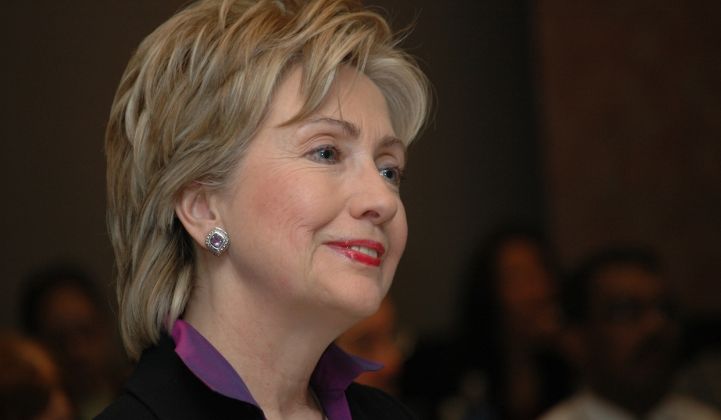When Democratic presidential candidate Hillary Clinton sat down with the Las Vegas Sun last week to chat with the newspaper’s editors, the first question wasn’t about jobs, gun control or Benghazi.
The first question was about solar.
In a wide-ranging interview with the Sun, Clinton was asked about Nevada regulators’ controversial decision to retroactively cut net-metering rates for rooftop solar in the state.
A few days before Christmas, Nevada utility commissioners unanimously voted to slash net-metering rates and increase monthly service charges for solar-system owners. The rules were retroactively applied to every solar system in the state -- sparking outrage from customers who had invested in PV systems with the expectation that they'd get paid the retail rate.
Leading solar companies swiftly pulled out of Nevada and cut hundreds of jobs.
“The retroactivity piece is extraordinarily problematic,” said Sunrun's policy manager in an interview with GTM. “Nevada essentially baited solar companies into the state, and baited homeowners to go solar, and then switched the rules of the game. It’s the most egregious anti-business, anti-solar decision that we’ve seen promulgated in any state in the country.”
In her conversation with the Sun, Clinton did not offer specific thoughts on how to compensate solar. But she agreed with the solar industry that retroactive cuts are bad for investment and jobs -- and unfair to homeowners.
Las Vegas Sun: You’ve been a supporter of clean energy and, more specifically, solar power. Our Public Utilities Commission dealt a significant blow to the state’s solar future just before Christmas. What are you going to do as president to ensure the future of the solar industry?
Clinton: I know there will be a hearing about this decision in the next few days. I think it's important we give investors certainty and we give consumers choice. We're never going to transition to clean renewable energy if we don't do that.
Just look at the jobs that are being created. Nationwide, 174,000 jobs in the last few years. Here in Nevada, 5,900 jobs -- 3,900 just last year. This is a win-win to move us away from fossil fuels, to diversify the grid, to give homeowners a chance to be empowered to do something about their own energy usage and put people to work.
I hope there is a way that this state can figure out a path forward. Every state is somewhat different. Every state has different rules and regulations and investment climates, but I'm absolutely convinced we're going to have to do more solar, more wind and more renewables if we're going to have the kind of future we should.
I don't know all of the public utility rules in Nevada, but certainly people who acted in good faith should be given the benefit of that moving forward. I don't think any change in rules should penalize people who were permitted and encouraged to do what folks have done. They shouldn't see that investment absolutely destroyed. I'm hoping that there can be a sensible recognition of the benefits that this provides and the investments that people have already made.
Nevada's rooftop solar industry exploded in 2015. According to GTM Research's Cory Honeyman, the state was ranked 28th in residential solar installations in 2013. It rose to 14th place in 2014, and then to second place last year. Residential solar volumes grew tenfold from 2014 to 2015.
In recent quarters, 90 percent of those installations were financed through third-party power-purchase agreements. If lower rates apply to those existing contracts -- which were crafted with the assumption that net metering would remain at the retail rate -- some worry about a wave of defaults.
"It would be very unusual for a PUC to force a change in PPA pricing at any point during the term of a PPA. However, this is essentially what the PUCN has done when it voted to retroactively apply new, discriminatory pricing on existing NEM customers," wrote a group of leading venture investors in a letter to state utilities commissioners.
The Nevada Public Utilities Commission is currently reviewing public comments on the rate change. Regulators could issue a final decision this week.
Sign up early for our Solar Summit 2016 in Scottsdale, Arizona. Trevor Houser, the energy policy advisor for Hillary Clinton, will join us to talk about her plan for solar.



